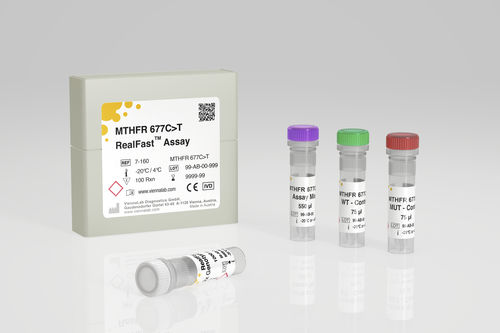
- Laboratory
- Laboratory medicine
- Cardiovascular disease test strip
- ViennaLab Diagnostics
Atherosclerosis test strip RealFast™for genetic mutationshomocysteineimmunoassay
Add to favorites
Compare this product
Characteristics
- Applications
- for atherosclerosis, for genetic mutations
- Tested parameter
- homocysteine
- Analysis mode
- immunoassay
Description
Mutations in the methylenetetrahydrofolate reductase (MTHFR) gene are associated with decreased enzyme activity, which leads to hyperhomocysteinemia and toxic side effects of methotrexate therapy. ViennaLab assays identify patients predisposed to develop cardiovascular diseases or intolerance to methotrexate.
Elevated levels of homocysteine, an intermediary product of the methionine metabolism, are an established risk factor for atherosclerosis and arterial thrombosis.
Two common variants in the MTHFR gene, 677C>T and 1298A>C, contribute to reduced enzyme activity and thereby to hyperhomocysteinemia.
Consecutively, hyperhomocysteinemia may affect methotrexate sensitivity and contribute to toxicity.
Homozygosity for 677C>T or compound heterozygosity for 677C>T / 1298A>C conveys a significantly higher risk for negative side-effects of methotrexate medication.
Identification of these genetic variants in the MTHFR gene is crucial for an adequate and safe methotrexate therapy.
Catalogs
Related Searches
- Assay kit
- Blood assay kit
- Molecular test kit
- Whole blood detection kit
- Lateral flow test kit
- Test strip
- Cell assay kit
- Oncology test kit
- Genetic test kit
- Tissue detection kit
- PCR assay kit
- Nucleic acid assay kit
- Biochemistry assay kit
- Blood test strip
- DNA assay kit
- Genetic mutation detection kit
- Protein test strip
- Pharmacology assay kit
- Immunoassay test strip
- Clinical test strip
*Prices are pre-tax. They exclude delivery charges and customs duties and do not include additional charges for installation or activation options. Prices are indicative only and may vary by country, with changes to the cost of raw materials and exchange rates.






